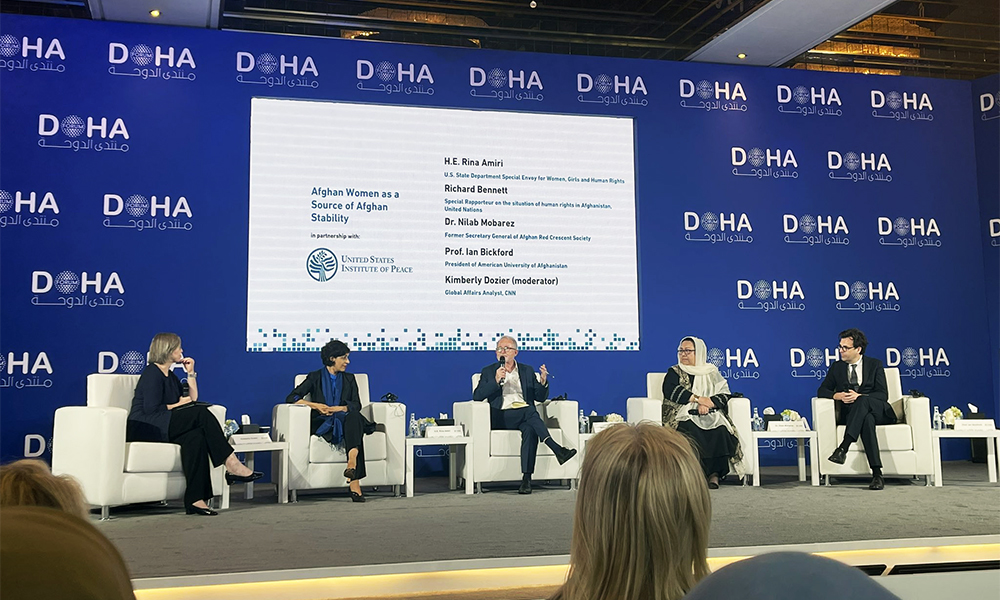Latest News
Bennett describes IEA as united but divided over girls’ education

The UN’s Special Human Rights Rapporteur for Afghanistan, said on Sunday at the Doha Forum that the Islamic Emirate of Afghanistan (IEA) has a unified vision, but is divided on the issue of women’s education.
According to Richard Bennett, a former Minister of Higher Education of the Islamic Emirate was dismissed for supporting women’s education.
He did not name the dismissed official, but before Nada Mohammad Nadim, Acting Minister of Higher Education, Abdul Baqi Haqqani was acting minister of higher education.
“The unity of the Taliban (Islamic Emirate) is one of their strengths, because they consider unity to be very important. But in the matter of education, I don’t think they have this integrity. We have seen this difference in some statements,” Bennett said.
He also said that in a meeting with the former minister of education, the official talked about providing education for girls in universities in separate classes.
“We had detailed technical discussions about the education of women and girls,” Bennett said. However, the minister was removed from his post a few months later, Bennett said.
Bennett said it was probably because “Kandahar saw his views on education as very open and progressive.”
At the same time, the special representative of the US for Afghanistan’s women’s affairs and human rights also said in this meeting that the Islamic Emirate’s policies towards women have no religious or economic basis.
Rina Amiri, criticized the restrictions imposed on women’s right to education, work, travel and political participation, and said that these restrictions have no economic basis. According to the United Nations assessment, due to the unemployment of women in Afghanistan, $1 billion dollars of income has decreased and the work ban and ban on women’s education has had a destructive effect on families.
“I don’t think it has an economic basis, certainly not,” said Amiri.
She said the United Nations has “estimated that Afghanistan has lost more than $1 billion dollars in income, and this is actually destroying Afghanistan.”
Emphasizing that banning women’s education and work has no religious basis, Amiri said that 57 countries in the world said at the meeting of the Islamic Organization that banning women’s education and work is in conflict with Islamic values.
“I don’t think it has anything to do with religion,” she said. “I was earlier at the conference of the Organization of Islamic Cooperation of Women in Jeddah, where 57 countries participated and said that this is against the holy religion of Islam, this is politics.”
The Islamic Emirate, however, says that human rights and women’s rights are provided within the framework of Sharia law and they do not allow outside interference in internal matters.
Latest News
Continued aid to Afghanistan vital for regional security: Kazakh president

Kazakhstan’s President Kassym-Jomart Tokayev has emphasized the continuation of humanitarian assistance to Afghanistan, stating that the ongoing provision of such aid plays an important role in ensuring regional security.
Speaking at the international conference “Peace and Trust” in Ashgabat, the capital of Turkmenistan, Tokayev described addressing complex humanitarian challenges and the reconstruction of Afghanistan as a necessity.
“To ensure regional security, we consider it essential to continue providing assistance to Afghanistan, including by strengthening international efforts to address complex humanitarian issues and the reconstruction of this country. Kazakhstan remains committed to supporting the people of Afghanistan through humanitarian aid, educational projects, trade development, and food security initiatives,” he said.
Meanwhile, experts believe that sustainable improvement of the humanitarian situation in Afghanistan requires broad cooperation from the international community and support for the country’s economic development.
“Investment can be defined as one of the fundamental drivers of the economic cycle, and whenever Afghan traders do not take their money out of the country and instead invest domestically, it naturally leads to greater growth and dynamism in Afghanistan’s economy,” said Abdul Zahoor Modabber, an economic analyst.
As the humanitarian crisis in Afghanistan continues, reports by international relief organizations indicate that millions of citizens of the country are in urgent need of food, health, and livelihood assistance.
The reduction in funding for aid organizations, the impacts of climate change, and the return of migrants have increased concerns about a further deterioration of the humanitarian situation in the country.
Latest News
Islamic Emirate declines to attend Tehran meeting on Afghanistan
Latest News
Sirajuddin Haqqani: A government that intimidates its people is not a true government

Khalifa Sirajuddin Haqqani, Minister of Interior of the Islamic Emirate of Afghanistan, said during a visit to Khost province on Friday that any government which rules through fear cannot be considered a true government.
“A government is one that is loved by its people, one that serves them with respect and compassion, and from whose behavior people learn ethics and sincerity,” he said.
Haqqani also stressed that Afghans who opposed the Islamic Emirate in the past should be tolerated and treated in a way that helps eliminate hostility and animosity, paving the way for national cohesion.
-

 Latest News2 days ago
Latest News2 days agoMuttaqi: Afghanistan’s progress requires both religious and modern education
-

 Sport4 days ago
Sport4 days agoILT20: Desert Vipers edge Gulf Giants in historic super over thriller
-

 Regional4 days ago
Regional4 days agoSix Pakistani soldiers killed in TTP attack in Kurram District
-

 Business4 days ago
Business4 days agoTrade bodies warn almost 11,000 Afghan transit containers stuck at Karachi port
-

 World4 days ago
World4 days agoPowerful 7.6 earthquake hits northern Japan, tsunami warnings issued
-

 Latest News3 days ago
Latest News3 days agoTrump calls Afghanistan a ‘hellhole’ country as US expands immigration restrictions
-

 Sport3 days ago
Sport3 days agoCommanding wins for Arman FC and Sarsabz Yashlar in Afghanistan Champions League
-

 Latest News5 days ago
Latest News5 days agoPakistan’s top general calls on IEA to pick between ties with Islamabad or TTP

























